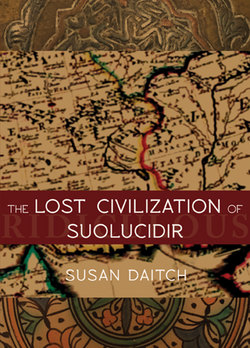Читать книгу The Lost Civilization of Suolucidir - Susan Daitch - Страница 6
На сайте Литреса книга снята с продажи.
ОглавлениеAsoldier looked over the parapet and thought no army could even begin to crack open the towers that marked the corners of the city. A mason, though his spine ached from being torqued and twisted as he worked, wiped his nose on the back of his hand and was confident few foreigners could navigate the labyrinth he’d helped to construct. It ringed the metropolis like a moat, although no one in the city knew the word. Both the soldier with a view of the desert to the east and mountains to the west and the mason down below on the street felt safe; both looked out on landscape and urban geography from opposing perches, convinced there was no threat that would change the pattern of one day to the next. In the center of the city a cook watched her pots dance on hooks and knew that even if she ran out of her house, odds were good she wouldn’t make it out of the city before everything she took for granted would collapse around her ears.
Elsewhere in town at that moment:
A child was about to apologize for tormenting a cat. He twisted his hands behind his back, nervous, expecting blows, not sure what form punishment would take.
A woman was about to drink a glass of wine when she thought her overseer wasn’t looking. She leaned against a broken mosaic of a winged lion, tiles making a cool grid pattern on her back. She thought she was hidden by a column and intended to swallow the glass in one gulp.
A man was about to kiss his neighbor’s wife. He pulled her into an alley as she was leaving what passed as her house. The street was so busy, he thought, they both thought, no one was looking.
An executioner was about to cut off the head of a runaway slave. The slave shook, so the executioner was unsure what the blade would actually sever when it fell, though he didn’t care much either way. Whatever body part was lopped off was all in a day’s work.
A hungry traveler, having seen Hamoon Lake evaporate into a shiny crust that crumbled into sand underfoot was relieved to see the city rise before him like an oasis. He knew it was real, and it was also home. He quickly ran through the maze, reached his house, a square two-story building the color of melon rind. In his long absence he’d so often dreamed of its two rooms, one on top of the other. Ravenous, when food was placed in front of him, he scooped up sticky pieces of rice and lamb with his hands without stopping for any ritual washing. Before he could show his family the silk and spices in his bags, just as he was about to swallow a mouthful of lamb, a sandstorm swept over the city like a tidal wave so high even the square lookout towers were buried without a trace. If this wasn’t what reduced the city to a basin of sand, the catastrophe might have taken the form of an earthquake. In a few minutes all that poked out above the surface of the rubble was the jagged edge of a wall, the blade of an axe, a human arm, maybe. And if the city survived the irritated shoulder shrug of tectonic plates there was Taftan, four thousand forty-two meters in height, a volcano that rose abruptly from the midst of the flat landscape. One big burst of lava and groves of olive, almond, and cherry trees would be reduced to cinders, the child offering milk to the cat, the lips about to touch, blade suspended mid-air, all frozen, turned to stone. For whatever reason, the city was destroyed.
